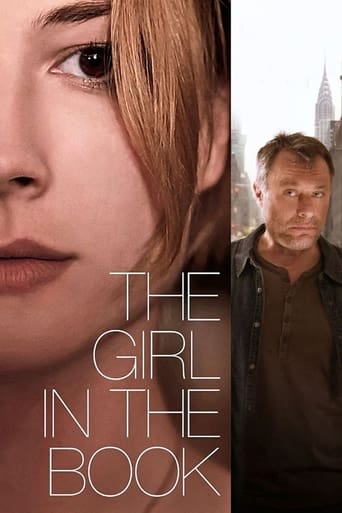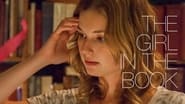TheLittleSongbird
Any film that covers the subject of rape/sexual abuse and its mental and emotional repercussions deserves to be applauded. It is a very difficult and sensitive subject that is also surprisingly complex when you see it from the victims' point of view.'The Girl in the Book' is not the first film to explore the subject of rape/sexual abuse, and there are better overall examples when it comes to recent examples of films covering the subject it fares favourably. The last film seen by me exploring the same subject was 'Return to Sender' from two years ago, despite my admiration for Rosamund Pike (a good performance in a mediocre at best film) 'The Girl in the Book' is the much better film, being much better written, acted and easier to swallow on the most part. Again on the most part, 'The Girl in the Book' is a good film and a brave and well done exploration of a difficult subject that is harrowing and sensitive and not easy to talk about. It is also often misunderstood, with generalising, misconceptions and even with victim-blaming, which is good reason as to why it could be addressed more.The first 10-15 minutes are on the erratically paced side and the two stories/time-line structure from the past with younger Alice and the present with older Alice is initially a little confusing and not as easy to follow as it could be. A longer length would definitely have helped, the film is too short which did make it occasionally jumpy and rushed.If one feels the same and is considering switching it off, stick with it. The structure becomes clearer and while doing it in a nuanced way the film really comes to life. Sadly, 'The Girl in the Book' does fall apart in the final act, or the last half an hour, where it is too reliant on coincidences delivered in a very clunky fashion, things are wrapped up too tidily and conveniently and it just feels illogical and although intended to be inspiring the outcome felt forced and tacked on, hardly applying to a lot of victims and even when there are victims that do move on to some extent they never forget it.On the other hand, 'The Girl in the Book' has a lot to recommend it. It is photographed with a lot of fluidity and atmosphere and the editing is always crisp and cohesive. The music, when used, never overbears the drama but is never too low key either. Marya Cohn makes a remarkably auspicious directorial debut, pacing enough of the story beautifully and being alert and accommodating to the actors, allowing them to bring believability and nuanced layers to otherwise fairly clichéd roles (particularly striking in this case is Alice, both older and younger).'The Girl in the Book's' script is deft and can be surprisingly rich, clunking only in the final 30 minutes. Much of the story is clear, appropriately paced (though it is less than perfect in this regard) and dealing with its subject in a way that's harrowing, intelligent and poignant (there is little trivialising or sugar-coating here), making one really relate to Alice. A lot of the numerous twists are unexpected, logical and hit hard, if one feels uncomfortable watching that isn't a bad thing.Every bit as impressive, in fact even more so, is the acting, with a particularly exceptional (haven't used that word often recently but in this case it is more than well deserved) performance from Emily VanCamp, bringing so many layers from guilt, shame and tormented pain but also determination and conscientiousness with defiant commitment and touching nuances to a character she makes complex and easy to relate to, yes even to people who have not been through rape/sexual abuse themselves. Ana Mulvoy-Ten portrays the younger Alice every bit as believably, going through a wide range of emotions hit perfectly.Similarly, 'The Girl in the Book' boasts a (relatively) atypically chilling Michael Nykvist (best known to me as the male lead in the Swedish 'The Girl with the Dragon Tattoo' trilogy) who does a fabulous job making his character as loathsome as can possibly be, his death from lung cancer earlier this year was and still is a very sad loss. David Call brings a sympathetic charm and makes the most of what is essentially a plot device character. Michael Cristofer plays a dismissive and cold father figure wonderfully, making one hate him just as much as Nykvist's Milan. Ali Ahn is fine too and one can easily identify with her having her heart in the right place and being the voice of reason.Overall, doesn't completely engage at first and let down badly by the final act, but if stuck with it's very well done and absorbing. 7/10 Bethany Cox
Larry Silverstein
Emily VanCamp is excellent here starring as Alice, a self-destructive young woman working as an editor for a book publisher, in NYC. Her boss (Jordan Lage) discounts her abilities, and really just wants her to be his personal secretary. Her father (Michael Cristofer), a literary agent. is an overbearing and boorish slimeball. However, when Alice's boss wants her to manage the re-release of an acclaimed best seller, some 15 years before, as an e-book, it will rekindle horrific and painful memories for her that occurred at that time. Often told through flashbacks, we see 16-year-old Alice being manipulated and sexually abused by the book's author Milan Daneker. The superb actor Michael Nyqvist is perfectly cast as Milan, and is so believable and despicable you just want to reach through the screen and give him a smack.As a result of all this, Alice has such a poor self-image that she has become promiscuous, with her life filled with one-night stands from bar pick-ups. The crucial question, and the crux of the movie will be whether once she meets a nice guy and solid citizen (David Call), can she finally have a loving and meaningful relationship, or will she revert to her old ways?In supporting roles, I thought Ali Ahn did a fine job as Sadie, Alice's best friend, and Ana Mulvoy-Ten was most solid as young Alice. The movie was written and directed by Marya Cohn, who's making her feature film debut here, and I read the film is semi-autobiographical. I would be interested in seeing what else Cohn brings to the screen.In summary, as mentioned, this is not an easy film to view, but, overall, I came down on the positive side after seeing its rather uplifting final segments.
Leopardman4
The central character here is clearly a victim, and yet, by the middle of the pic, she is turned into a latter-day Hester Prynne -- without the overt tribal ritual of the Scarlet Letter.She is pilloried for bedding -- or for appearing to bed -- a teenage babysitter at the house of her best friend. Really? I mean, hey, c'mon, like, who hasn't done that? Okay, I'm kidding, maybe it's been months or even years since you've done that, but the point is, this is the place in this moralistic tripe where she becomes some kind of sexual villain?! Don't bother telling that babysitter kid because he's already on the blower telling his entire school how he and a twenty-something done done the deed.And that sad excuse for a boyfriend, the social activist savior? People with good intentions will stand by and weep while you burn at the stake. And why? Because, they will say, "She brought it on herself." And then the weasel will run for public office over your dead body.Who are we talking to here? YOU. You if, when she finally went to confront her seducer, you weren't hollering at the screen, "Kick him in the nuts, honey!"And then hollering, "TWICE!"(If you're a guy, and you can look at Emily VanCamp's face without seeing that she's the victim, then you have earned all your credits to graduate from Gay University...) :-)
dansview
It's one thing to show a movie about a college professor seducing a college student, but a middle aged man seducing a 14 year old? If we are to believe that this guy actually did that, than he is basically a monster. Why would the girl even speak to him later? Having said that, I don't think they ever had sex. If they did, that would have been much more traumatic and the story would have been about statutory rape, not molestation.The actors do a good job. I like the fact that her friends didn't just take her indiscretions lightly due to being N.Y. liberals. They called her out on her immoral behavior and made her suffer and repent.I understand that the woman who created this story was trying to make a statement about sexual abuse, but in reality she kind of just played to men's prurient interests by showing the scenes she did. Some of them were gratuitous.The whole thing was so slow. Why couldn't our main character just tell everyone off early on and get on with her life? I found the older guy so creepy and our protagonist's continual toleration of him annoying. Even when she does tell him off, it's pretty weak.The Asian lady, the dad, the editor, and the boyfriend were all excellent. But I wouldn't watch it knowing what I know now. It's boring and pointless. However, there were enough decent pieces of dialog and emotion to redeem it from the much lower rating I contemplated.




